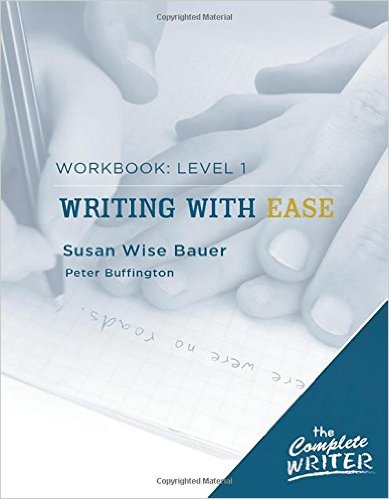For my son’s yearly checkup, we took him to the pediatrician who has seen him since he was one day old. It’s one hour away from home, but it’s worth it. We make a day of it, or half a day of it. Everything looked great and the doctor especially remarked how well-spoken my son was.
This pediatrician sees a lot of kids these days who answer his questions with one syllable: yeah, no, uh, err… My son answers in long sentences, four or five of them, and gives many details. Sometimes I think too many. We have to stop him gently and let other people continue the conversation.
I was proud, of course, that the doctor made that positive observation. Today, when I worked with him on reading comprehension and answering questions in full sentences, I was reminded of it.
We are working through Writing with Ease – everything is laid out and we just read and write, answer questions and do some copywork. Great stuff. Language arts at its best. Highly recommended.
We can actually do four lessons in one day, because it’s not that much and it takes about 20 minutes. Little sister sits through because the stories are lovely. She likes to answer questions, too. It counts as school for her, naturally. It’s a win-win.
We used to do one lesson per day, as recommended, but it was too short and too slow. Besides, my son is in second grade and this is Level 1. I would like to start Level 2 by January. Either way, we are fine, because the author actually says Level 4 is not even necessary. The material is advanced. But it’s a new goal and it works for us so I am sharing because it might work for others, too.

I so appreciate Sudan Wise Bauer’s work and your SOTW posts, so thank you for the language arts recommendation. As for your son’s conversation skills, it’s wonderful that he has a friendly personality. I also think homeschooling helps children view adults as fellow people (and possible friends?) rather than as authority figures (mostly to be avoided). I often sense the latter view from children after they’ve been in school for a few months–it’s a bit sad.
Good point, some kids are just friendly. Others have the vocabulary but are shy. And yes, I agree with the second point. I have noticed the attitude difference toward adults. The crazy thing is, most adults think going to school helps with socialization… and then they wonder why children do not respect authority figures and adults in general. Well, your actions are teaching the children that they must get along with the children around them, in the name of socialization. That includes going along with anything the kids are doing, just to fit in…